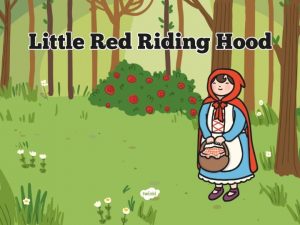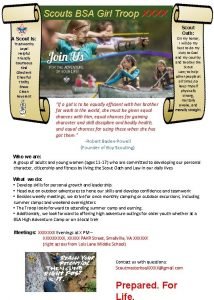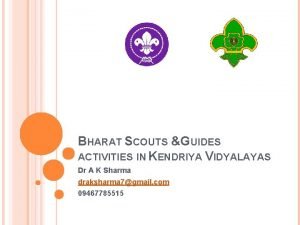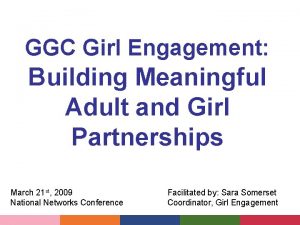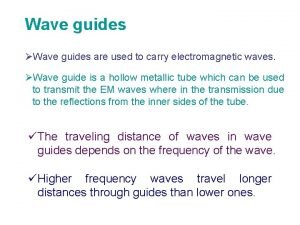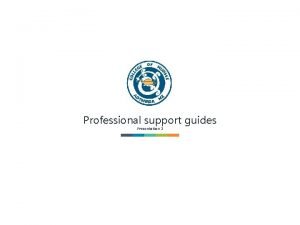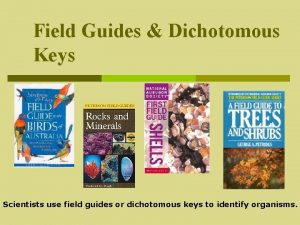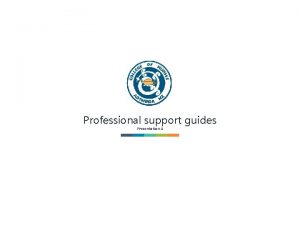Girl Guides Foundation and history Girl Guides and








- Slides: 8

Girl Guides

Foundation and history Girl Guides and Girl Scouts are movements similar to Scouting originally, and still largely, for girls and women only. It evolved in 1909 from girls wishing to take part in the boy-only Scout movement The name "Guides" was taken from a famous frontier regiment in the British Indian army, the Corps of Guides, which was noted for its skills in tracking and survival

Key points Promises • duty to God or to your religion • duty to your country • keeping the Guide Law o o The Good Turn The left handshake The Motto – "Be Prepared The Guide Sign Two central themes are domestic skills and "a kind of practical feminism which consists physical fitness, survival skills, camping, citizenship training, and career preparation"

Uniform The uniform is a specific characteristic of Scouting Guide uniform varies within cultures, climates and the activities undertaken. In some places, uniforms distributed by approved companies and the local Guiding organization. In other places, members make uniforms themselves

Emblem The World Badge – The three leaves of the trefoil stand for the threefold Promise. The vein in the centre is a compass needle and the two stars stand for the Promise and the Law. The colours stand for the golden sun shining over all the children of the world, from a blue sky. The World Flag – This is in the same colours as the World Badge and can be carried or flown by any member of the movement. It is often used as the Unit Flag. The three yellow blocks represent the threefold Promise and the white corner represents the commitment to peace of all WAGGGs' members.

Around the world There are now millions of Guides worldwide. The World Association of Girl Guides and Girl Scouts (WAGGGS) was formed to link them together The World Centres – There are four Guide homes in different parts of the world: Our Chalet in Switzerland; Pax Lodge in London; Our Cabana in Mexico; and Sangam in India.

In different places around the world, the movement developed in diverse ways In some countries, the girls preferred to call themselves ‘Girl Scouts’ § A Rainbow Guide in England, Scotland or Wales , a Daisy Girl Scout in USA and a Spark in Canada for girls who is between the ages of 5 and 7. § Brownies are for girls aged 7 years old to 10 years old § Rangers or Ranger Guides for those who is between the ages of 14 and 25

Application Girl Guides and Girl Scouts are movements similar to Scouting originally, and still largely, for girls and women only. In 1909 Lord Robert Baden-Powell, the founder of Scouting, when faced with an increasing number of girls wishing to take part in Scouting decided that girls should have their own separate movement, and the Girl Guides were founded in the UK in 1910 by his wife, Olave St Clair Baden-Powell. The name "Guides" was taken from a famous frontier regiment in the British Indian army, the Corps of Guides, which was noted for its skills in tracking and survival. Things that are shared amongst all Guide Units are: The Guide Promise – Girls become Guides by making their Promise. Each country has its own Promise, but historically all have the same three parts: duty to God or to your religion; duty to your country; keeping the Guide Law. The Good Turn – Each Guide tries to do a kind thing for someone else, without payment and without being asked, every day. The Guide Sign – The three fingers stand for the three parts of the Promise. This sign is used when making or renewing the Promise and can be used when meeting other Guides. It may also be used when receiving a badge or at the end of meetings. The Motto – "Be Prepared" – This means that Guides are ready to handle with anything that might come their way. The left handshake – This is the way members of the Movement greet each other. Two central themes have been present from the earliest days of the movement: domestic skills and "a kind of practical feminism which embodies physical fitness, survival skills, camping, citizenship training, and career preparation. Most activities are similar to those of the (Boy) Scouts. . The World Badge – This can be worn on uniform or ordinary clothes. The three leaves of the trefoil stand for the threefold Promise. The vein in the centre is a compass needle and the two stars stand for the Promise and the Law. The colours stand for the golden sun shining over all the children of the world, from a blue sky. The World Flag – This is in the same colours as the World Badge and can be carried or flown by any member of the movement. It is often used as the Unit Flag. The three yellow blocks represent the threefold Promise and the white corner represents the commitment to peace of all WAGGGs' members. . The uniform is a specific characteristic of Scouting. Robert Baden-Powell said it "hides all differences of social standing in a country and makes for equality; but, more important still, it covers differences of country and race and creed, and makes all feel that they are members with one another of the one great brotherhood“ Guide uniform varies within cultures, climates and the activities undertaken. They are often adorned with badges indicating a Guide's achievements and responsibilities. In some places, uniforms are manufactured and distributed by approved companies and the local Guiding organization. In other places, members make uniforms themselves Around the world February, 22 - a birthday of Robert and Olave Baden-Powell and World Thinking Day. This day is celebrated by all Girl Guides and some Scouts all over the world. In different places around the world, the movement developed in diverse ways. Internationally it is governed by the World Association of Girl Guides and Girl Scouts (WAGGGS) with member organisations in 145 countries. . There are now millions of Guides worldwide. The World Association of Girl Guides and Girl Scouts (WAGGGS) was formed to link them together. In some countries, the girls preferred to call themselves ‘Girl Scouts’. Also Girl Guiding divides in sections by age category. For example: There are A Rainbow Guide in England, Scotland or Wales , the equivalent is a Daisy Girl Scout in USA and a Spark in Canada. They consists girls who is between the ages of 5 and 7. Then there are
